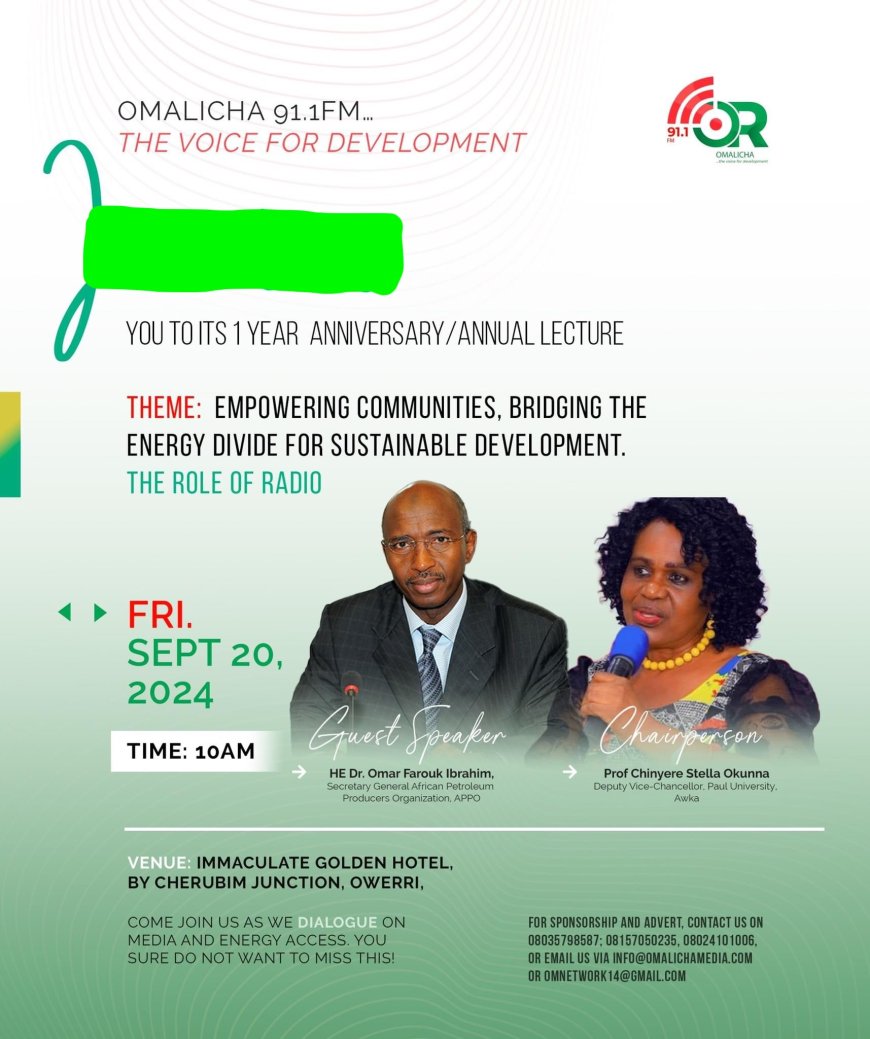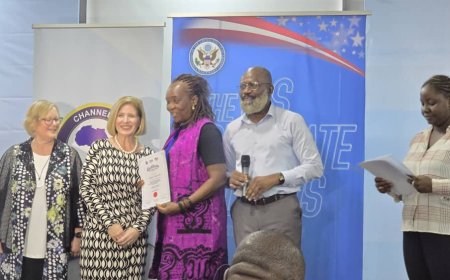Energy, key to meeting human needs – Omar Farouk Ibrahim
The lecture had the theme: Empowering Communities, bridging the energy divide for sustainable development, the role of radio.

Prof C. S. Okunna
Dr O. F. Ibrahim, SG, APPO
Prof I. L. Worika
Meeting the most basic needs of shelter, food, and health, among others, has been described as a precursor to self-actualization and development.
This was the assertion of the guest speaker at a lecture held month to mark Omalicha’s 1st year Anniversary of Omalicha 91.1fm in Owerri, the Imo State capital. The lecture had the theme: Empowering Communities, bridging the energy divide for sustainable development, the role of radio.
Prof. Ibibia Lucky Worika, who represented the guest speaker Dr. Omar Farouk Ibrahim, Secretary General, African Petroleum Producers Organization, APPO, noted that the topic consisted of concepts that are at the center of a nation’s development. Outlining these concepts as empowerment, access to energy and sustainable development, the speaker added that these play key roles in meeting and even surpassing the basic needs of human beings.
Drawing generously from Maslow’s pyramid of needs, the guest speaker discussed the hierarchy of needs starting from some of the basic needs of humans such as food and shelter, which as stated by the late American psychologist, must be met before one can aspire towards self-actualization, the highest on the pyramid of needs.
He added that underdeveloped countries are those countries that are still struggling to meet the most basic needs of their people. “They can barely feed and clothe their population, good drinking water is lacking, infrastructure is almost non-existent, with the bulk of their population lacking adequate housing.”
On empowering communities, Worika, himself, a professor of Petroleum Law and director, School of Advanced Law Studies at the University of Port Harcourt, said that the provision of infrastructure and these basic needs empowers citizens, adding that an empowered citizenry creates empowered communities because we exist in communities.
Speaking on the importance of energy in all of these, the speaker noted that studies and experiences have shown that in the first industrial revolution, energy was key to meeting and surpassing the physiological (basic) needs of human beings. Nigeria ranked as one of the poorest countries in the world, is so ranked because amongst others, the country suffers the effects of energy poverty, which is quite limiting in the quest for individual and community development.
Quoting the group, habitat for humanity which described energy as “lifesaving as it’s absence negatively impacts the health, education, social and economic lives of people and communities, while causing unemployment, the speaker went ahead to say that energy empowers communities and lack of it under develops and in turn, disempowers communities. Lack of energy he said, can lead to poverty.
The presentation underscored the urgent need for the equitable provision and distribution of energy in Nigeria and ensuring that communities in both urban and rural settings especially in the rural areas also have access to it. For instance, the speaker noted, that “primary healthcare system in Nigeria is severely impacted by lack of access to electricity and energy services, especially in the rural communities. The inability to keep essential medications, such as vaccines refrigerated and respond to emergency situations are areas that reduce the ability of health workers to offer quality care to people with health issues”.
And this, he continued, is where the media steps in to play a role that is equally as vital, as it is a critical platform for the dissemination of information about energy access, available renewable technologies and sustainable practices that could be adopted to set them on the path of development.”
Breaking the topic down during the discussion session, Dr. Ihuoma Ahaotu of the University of Port Harcourt, Rivers State, focused on the impact access to (cheap) energy can have on a young entrepreneur or researcher; and the role radio can play in providing information on available forms of energy and how to access them to such young researchers and entrepreneurs.
Adding his voice to the discussion, especially the role radio can play in informing the people of availability and access, Prof Jerome Okonkwo of the Imo State University, Owerri, advocated for the promotion of the Igbo language and the importance of using it more in broadcasts to enlighten the people on the issue of access to, and availability of energy sources.
Earlier in her remarks, Chairperson of the event Professor Chinyere Stella Okunna, a professor of Communication Development, described radio as having the capacity for development, which other media do not possess. She commended the choice of theme as according to her, access to energy is primary in our part of the world. In any developing country, MSME’s are the engine of growth for the economy, and you cannot grow the economy without access to energy. She congratulated Omalicha 91.1FM , its team and the community that has welcomed the station for the strides already made, encouraging them to work towards having even more to celebrate at the next Anniversary.


